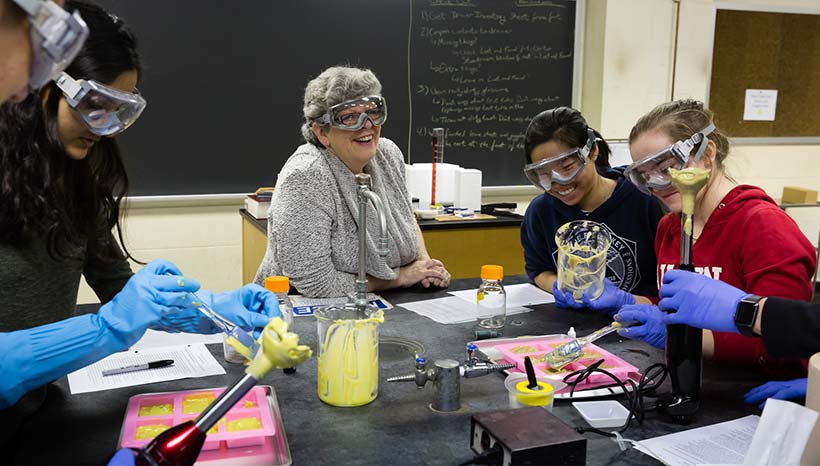
First-Year Seminar 117: “Liquid Gold: The Science, History and Social Context of Olives and Olive Oil”—Patricia O’Hara, the Amanda and Lisa Cross Professor of Chemistry.
Why invite new college students to spend an entire semester studying a small green fruit? Because, says Patricia O’Hara, the Amanda and Lisa Cross Professor of Chemistry, “the olive can be a vehicle for talking about just about anything.”
This past fall, the students in her new first-year seminar considered the central role of olives in the culture and economy of the Mediterranean, and the many references to the trees, fruit and oil in the Bible and the Quran. They worked in groups to construct a toy model of an olive press, later displayed in Keefe Science Library. They learned about the fraudulent olive oil racket—how not everything sold with the label “extra-virgin” actually meets that standard. They used olive oil to make soap. The many pre-med students, O’Hara says, were especially interested to examine the oil’s putative health benefits.
All of this was in service to the main goal shared by all first-year seminars at Amherst: to introduce students to the liberal arts through deep discussions, close reading of texts and a wide variety of writing projects. O’Hara—who helped to develop an interdisciplinary summer workshop on olives in Turkey starting in 2010, and is about to publish a book on the subject—assigned the first-years to write weekly reflective essays, journalistic critiques and chemistry pamphlets, in addition to longer midterm and final papers.
No olive oil seminar would be complete without a taste test. During November’s “sensory analysis” unit, the professor described how official tasting panels are conducted, how odorant molecules trigger chemical receptors in the nose and how bacterial and industrial factors can cause an oil to taste “peppery” or “pungent” or “musty.” Students sniffed and sipped extra-virgin oils from Chile, Crete, Spain and California, coughing and exclaiming over how strong and varied the flavors were.
“Everyone in that classroom had tasted olive oil [before],” says O’Hara, “but never really thought about it, I’m sure”—at least not in quite that way.